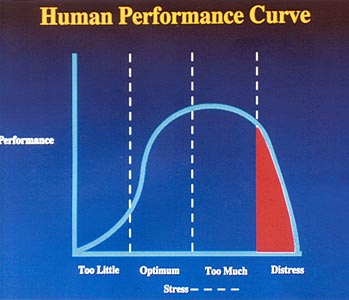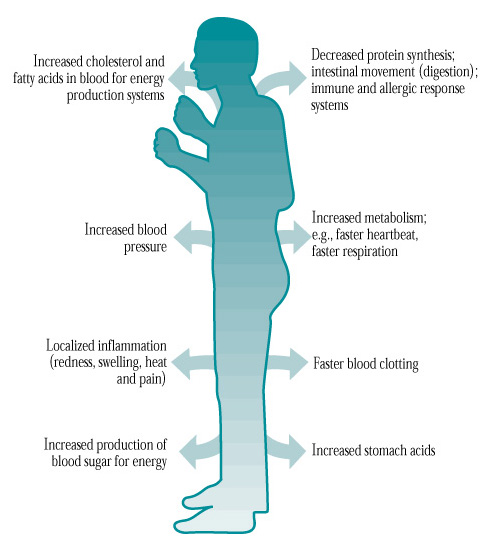|
Stress is the body's reaction to a change that requires a physical,
mental or emotional adjustment or response.
Hans Selye was one of the founding fathers of stress research.
His view in 1956 was that “stress is not necessarily
something bad – it all depends on how you take it. The
stress of exhilarating, creative successful work is
beneficial, while that of failure, humiliation or
infection is detrimental.” Selye believed that the
biochemical effects of stress would be experienced
regardless of whether the situation was positive or
negative.
Since then, a great deal of further research has been
conducted, and ideas have evolved. Stress is now viewed
as a bad thing, with a range of harmful biochemical and
long-term effects. These effects have rarely been
observed in positive situations.
The most commonly
accepted definition of stress (mainly attributed to
Richard S. Lazarus) is that
stress is a condition or feeling experienced when a
person perceives that “demands exceed the personal and
social resources the individual is able to mobilize.” In short, it’s what we feel when we think we’ve lost
control of events.
Stress is byproduct of
challenging students to learn. Approaches are needed
that reduce the negative aspects of stress (distress)
which lessen students' learning and performance. The key
to reducing distress is providing students with a
feeling of control over their education, information
about what to expect, and feedback regarding what can be
done to improve their performance. Students who do not
feel helpless will adopt their own coping strategies
Mechanisms that explain
why students perform badly under stress include
"hyper-vigilance" (excessive alertness to a stressful
situation resulting in panic i.e. over studying for an
exam) and "premature closure" (quickly choosing a
solution to end a stressful situation i.e., rushing
through an exam).

Feeling stressed is a
normal reaction to a situation which feels out of your
control. If you were to list causes of stress, many
would be about money, related to school, and worries
about coursework.
Other causes include
too little money, debt, no regular income, and financial
hardship, which are not things addressed here (but use
the same techniques to seek help). Under academic
stress you might list: too much time spent studying,
juggling commitments, “not enough hours in the day”.
Stress can be due to a
wide variety of psychological and physical factors, and
what is stressful to one person is not necessarily
stressful to the next or in the same magnitude. When
under stress, the body releases higher doses of a
hormone called cortisol, which helps mobilize energy
sources within the body. But, for reasons scientists
have yet to determine, an increased cortisol level is
also associated with a decrease in the functioning of
the immune system. Thus, a person who is under stress
often has a lowered resistance to infectious diseases.
In combination with broken rest patterns and poor
eating habits you become vulnerable to colds, etc. Have
you ever noticed how many students become ill near
mid-term, or around the time of finals? Stress is a
real!

There is an awful lot
of pressure on students these days to succeed and do
extremely well. A "stress inoculation" might inform
students in advance of what difficulties they might face
and encourage them to develop their own strategies to
achieve personal goals. Many students are averse to
asking for help.
It is a good idea to
find out what help is available on campus before you
become over-whelmed. Use University resources, web
searches, and friends before stress anxiety leads to
lowered self-esteem.
University counselors
can help you think more positively or direct you toward
other resources to help.
There is a substantial
amount of help available when people start to suffer
from stress. The thing to do is to ask for help.
Talking to someone – a friend, family member, tutor,
faculty member or professional counselor – is the key to
handling most problems. It sounds trite, but it is also
true, that a problem shared is at least a problem
reduced.
It's all too easy to skip a workout or pull an all-nighter to
finish your work, but it's more important than ever to
take care of yourself when you're under stress. When
you're feeling stressed the immune system functions less
effectively and you're more likely to get sick. You know
how far behind you fall when you get sick! It's
difficult, but essential that you maintain a healthy
diet, get regular exercise, and plenty of sleep to be
able to function at your best and get rid of the
mid-semester blues.
Discussing what causes
stress is one way to eliminate stress. Stress can be
reduced by getting plenty of sleep, eating well, and
exercise.
Here are a few signs of stress:
Physical
-
Elevated blood pressure
-
Headaches, aching neck and
shoulders,backache
-
Sleep pattern disturbed (difficulty
sleeping, or sleeping too much)
-
Weight change (Over-eating or no appetite)
-
Chronic fatigue
|
Emotional
-
Depression
-
Irritability, mood swings
-
Angry outbursts
-
Feeling uncertain / overwhelmed
-
Loss of emotional control
-
Helplessness/hopelessness
-
Suicidal ideation
|
Cognitive
-
Impaired concentration
-
Forgetfulness and confusion
-
Difficulty making decisions
-
Negative self-talk
|
Behavioral
-
Loss of interest in work / social activities
-
Increased drinking, smoking, drug use
-
Withdrawal from friends, family
-
Sexual problems
-
Parent-child and marital conflicts
|
To contact the Counseling Center
Services office
please call us at 443.885.3130 to schedule an
appointment or
click here. |